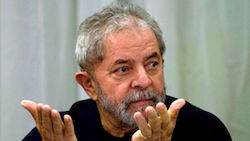Brazil’s former President Luiz Inacio Lula da Silva once again finds himself embroiled in a corruption scandal, this time via his son, further damaging the well-liked politician’s image and adding to the woes of beleaguered President Dilma Rousseff.
On October 26, Brazilian police searched the São Paulo offices of sports marketing firm LFT Marketing Esportivo, which is owned by Luis Claudio, the son of former President Lula da Silva, reported Reuters.
The raid stemmed from a tax-fraud investigation — known as “Operation Zealots” — into a group of companies that allegedly bribed officials that were on a tax appeals board within Brazil’s Finance Ministry in order to influence its rulings.
Investigators are seeking to determine if Luis Claudio received illegal payments from a lobbyist suspected of receiving tax breaks for car makers in Brazil by bribing government officials. According to The Wall Street Journal, federal investigators have summoned Luis Claudio for questioning.
Operation Zealots began in 2014, and police say the tax-fraud cases under investigation involve sums totaling nearly $5 billion.
InSight Crime
Lula has not been directly implicated in Operation Zealots, but his son’s involvement in the case further damages the image of the man Newsweek magazine once called “the most popular politician on Earth.”
Lula’s reputation had previously been tainted by investigations into a separate kickbacks-and-bribery scandal at state-run oil company Petrobras, known as “Operation Car Wash.” Most of the corruption allegedly took place during his administration, and the Supreme Court has ruled Lula can be questioned as part of ongoing investigations into Petrobras’ dealings.
SEE ALSO: Brazil News and Profiles
Lula is more directly tied to a third criminal case. He is currently being investigated for influence peddling after leaving office in 2010, under suspicion of accepting illegal payments to promote Brazilian companies overseas. Lula has defended his practices and denies any wrongdoing, saying he “will survive” investigations.
Nonetheless, Lula’s links to three investigations may feed into popular discontent over government malfeasance and the scale of the corruption taking place. For instance, individuals and companies involved in the Petrobras investigations recently agreed to give back to the Brazilian government a total of $622 million.
This succession of government corruption scandals has helped torpedo the popularity of Lula’s anointed successor Dilma Rousseff, while undermining support for their Workers’ Party and possibly frustrating a potential 2018 presidential bid by Lula.

